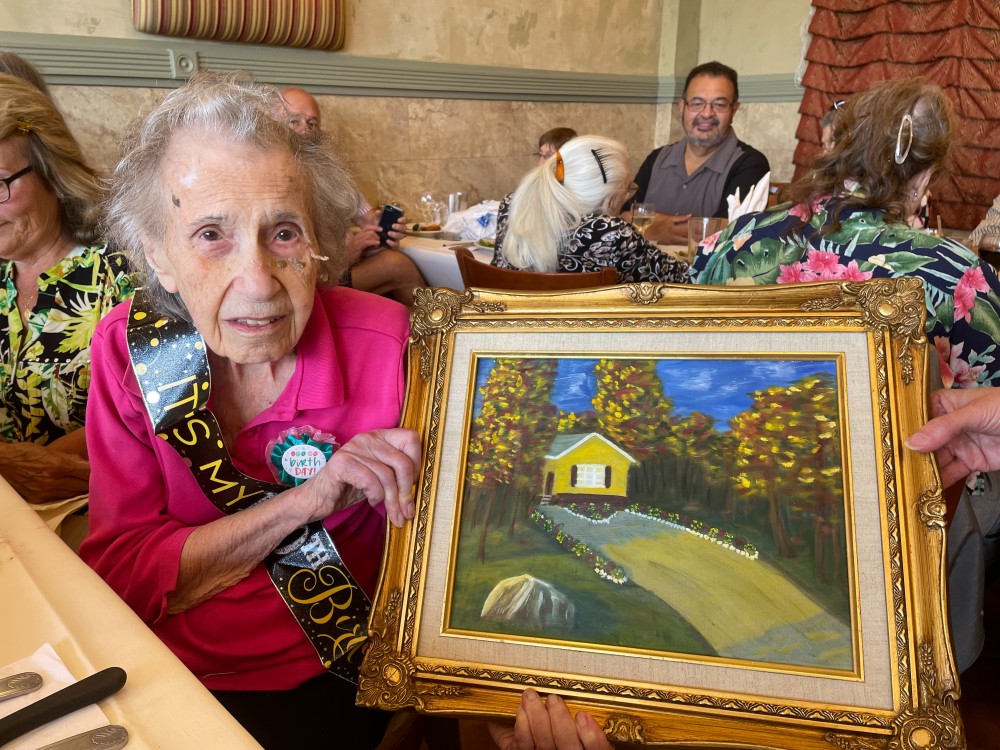
HOWARD BEACH — At 93 years of age, Marilyn McArdle admits that she has slowed down some and often needs her cane to help her steady herself. But while she gets around slower than she did when he was younger, there is one place she rushes to get to — the biweekly meetings of a support group at St. Helen’s Church in Howard Beach for people with physical challenges.
“I like it a lot. The people are friendly, and I feel good being around them,” said McArdle, who comes to the meetings with her neighbors, Mike and Maria Hernandez. Mike Hernandez also takes his wife, who is blind, and McArdle to Mass every Sunday at St. Helen’s.
Hernandez said the support group is a godsend to his wife. “She likes getting out of the house as much as she can, and this gives her a nice place to go,” he explained.
The official name of the group is the “Support Group for the Physically Challenged,” and its mission is two-fold: to provide spiritual, emotional, and social support for members of the St. Helen’s parish community facing physical challenges and to encourage homebound parishioners to participate in the sacramental life of the church.
“The church is a place where everyone is welcome, and with our group, we’re trying to live up to that idea,” Joan DeRiso, the group’s president, said at its annual luncheon at Lenny’s Clam Bar in Howard Beach on June 19.
The support group, formed 24 years ago by DeRiso’s late husband John and the Holy Name Society of St. Helen’s, draws 25-30 people to its meetings and includes, among its members, people in wheelchairs, those who depend on walkers, and folks with illnesses like multiple sclerosis and blindness.
Volunteer drivers transport many members to and from the sessions and often participate in the support group’s activities.
Father Michael Panicali, the parochial vicar for St. Helen’s, said the support group plays an important role in parish life.
“It gives people an opportunity to share their experiences with people who have gone through those same experiences. It can be difficult to get around if you have physical challenges, even in a major city like New York,” he explained.
Father Panicali said the support group can teach even those who aren’t physically challenged.
“People will look at a person in a wheelchair and feel sorry for them. But we need to look at each other as human beings, not as objects of pity,” he said. “People with challenges have full lives.”
Rosemarie Salas, one of the volunteer drivers, said the group is as valuable to people like her as it is to the physically challenged. “I get a lot out of it. I love helping people. It makes me feel good,” she added.
July is Disability Pride Month and is celebrated to commemorate the passage by Congress of the Americans with Disabilities Act (ADA) in 1990.
The ADA bans employment discrimination based on disability and mandates employers to make reasonable accommodations for disabled workers.
Father Panicali noted that both St. Helen’s Church and its rectory are accessible.
According to U.S. Census data, approximately 42.5 million Americans — about 13% of the population — are living with disabilities. The total includes people with difficulty walking, hearing, vision, and cognition.
While the support group meetings feature deep conversations, there is also time for fun. DeRiso works hard to ensure that sessions are entertaining, offering bingo games, dog racing videos, and guest speakers like lawyers and chiropractors. “I like to keep things light,” she explained.
DiRiso said the support group welcomes new members and needs volunteers to transport people to and from meetings.
Maria Myrick brings her 100-year-old mother, Yvonne Scorcia, to the meetings. She helps her out of the car and puts her in a wheelchair for the short trip inside so she won’t have to walk from the curb into the building.
“She likes the group a lot,” Myrick said about her mother. “We’re happy they have it. It’s good for families too.”
